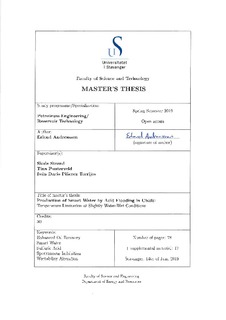| dc.description.abstract | Seawater has proven to be an excellent injection fluid in chalk due to its ability to alter the wettability towards more water-wet conditions at high temperatures. This chemically induced wettability alteration improves the overall oil displacement by spontaneous imbibition of the seawater into the chalk matrix. Research has verified that the interactions between potential determining ions (PDIs) Ca2+, Mg2+ and SO42- at the chalk surface can desorb acidic compounds from the oil. As a result, the degree of water-wetness increases. Additionally, by removing non-active salt, NaCl, from the seawater, the activity of the PDIs increases.
Smart Water is, by definition, an EOR-fluid with an optimized ionic composition able to improve oil recovery by wettability alteration. In carbonate reservoirs, seawater is considered a Smart Water. It is experimentally verified that seawater enriched in Ca2+ and SO42- and depleted in Na+ and Cl- has a significant effect on oil recovery in chalk.
In this thesis, the potential of producing an effective Smart Water by flooding sulfuric acid (H2SO4) through chalk is investigated. H2SO4 is a relatively cheap chemical if it can be used instead of other more expensive water treatments. The idea was that the H2SO4-solution would provide a controlled amount of SO42- and dissolve parts of the chalk; providing the solution with an equal amount of Ca2+. H2SO4-solutions of different concentrations were flooded through Stevns Klint (SK) outcrop chalk at 70 and 130C. The effluent was analyzed to track the dissolution of chalk and precipitation of anhydrite (CaSO4). Based on these tests, a model Smart Water was made with sufficient amounts of SO42- and Ca2+. Oil recovery tests by spontaneous and forced imbibition were used to evaluate the wettability alteration potential of the Smart Water at 70C. The total oil recovery was compared with similar cores imbibed with formation water (FW) and seawater (SW). A model crude oil with acid number (AN) of 0.50 mgKOH/g was used to establish initial mixed-wet conditions in the cores.
The H2SO4-flooding tests were successful in producing a Smart Water with desired amounts of SO42- and Ca2+ by dissolving some calcium carbonate (CaCO3) from the chalk core. No precipitation of CaSO4 was detected in any of the tests. The model Smart Water used in the oil recovery tests was 13 mM gypsum dissolved in DI water, which was meant to represent the solution obtained by injecting 13 mM H2SO4 through chalk.
Three SK chalk cores went through the same restoration process: the cores were cleaned and 10% initial FW saturation was established. Then, the cores were saturated with and exposed to the same amount of crude oil before being aged for two weeks at 70C. The spontaneous imbibition results, and subsequent calculated wetting indices, proved that neither SW nor Smart Water were able to induce any significant wettability alteration at 70C. A parallel experiment testing the Smart Water at 90C observed a change in wettability and an increase in oil recovery compared to SW (Lindanger, 2019). At higher temperatures, the PDIs become dehydrated and more reactive towards the chalk surface and, in turn, improves the wettability alteration.
The Smart Water did not have an improved EOR effect over SW or FW at 70C. The temperature was most likely too low, which reduced the reactivity of the PDIs. However, by increasing the temperature, the Smart Water was able to induce wettability alteration toward more water-wet conditions and displayed a favorable EOR effect. | nb_NO |

